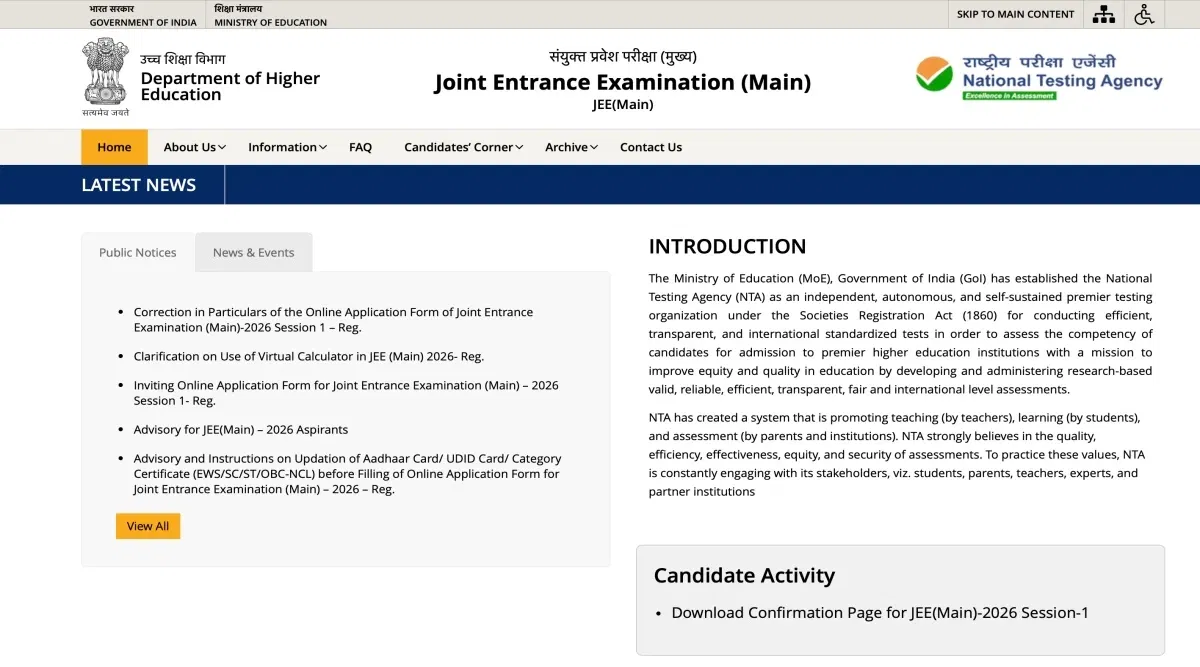GATE ecology and evolution syllabus 2025 is divided in five sections. Topics such as general aptitude, evolution, and behavioral ecology are included and a total of 65 questions are asked in this section.
Table of Contents
GATE ecology and evolution syllabus 2025 includes five main topics: ecology, mathematics, quantitative ecology, evolution, general aptitude, and behavioral ecology. Although a good portion of the GATE syllabus is from graduation level, still it is important that you know what all is really the part of the syllabus and what is not, along with how and with what you need to prepare and keeping what tips in mind.
The GATE syllabus 2025 has been released on the official website at gate2025.iitr.ac.in and the exam is scheduled to be conducted from Feb 1, 2, 15 and 16, 2025 as a computer based test.
GATE Ecology and Evolution Syllabus 2025: Section-Wise
Before starting headfirst into preparing for the GATE Ecology and Evolution syllabus from the very first topic or chapter you see, make sure to see once what all there is to study for in the whole syllabus so that you can gauge your areas of strengths and weaknesses and pace yourself accordingly.
There are 2 parts to the paper, which are explained below with what sections they contain and what do those sections hold for you.
General Aptitude Syllabus
This section is common for all GATE papers, not just Ecology and Evolution. It consists of 10 questions, 5 of 1-mark and 5 of 2-marks. General aptitude is assumed to be easy but it is at times tricky and causes mistakes leading to negative marking, so be conscious of what happens in this section.
The section that makes up this part is as follows:
- Verbal Aptitude: The verb-noun agreement, conjunctions, prepositions, articles, adjectives, tenses, other parts of speech; Vocabulary (phrases, words, & idioms); comprehension & reading, narrative sequencing.
- Analytical Aptitude: Analogy, logic including induction & deduction; relations between numbers & reasoning.
- Spatial Aptitude: Shapes transformations including assembling, grouping, translation, rotation, mirroring, & scaling; paper cutting, paper folding & 2-D and 3-D patterns.
- Quantitative Aptitude: Numerical computation & estimation; elementary statistics & probability; mensuration; geometry; data & graphs (bar graphs, pie charts etc.), 2- and 3- dimensional plots, tables & maps.
Also Check: What is a Good GATE Score 2025?
Core Subject Syllabus
This has the weightage of 85% in GATE Ecology & Evolution syllabus, being the core of what you are giving the paper for. It may seem too lengthy of a syllabus at first look, but it is manageable and honestly, is not as monstrous as it looks. With the addition of Applied Ecology and Evolution we have 5 sections within the GATE Ecology and Evolution syllabus, which are as follows:
- Ecology
- Evolution
- Mathematics and Quantitative Ecology
- Behavioural Ecology
- Applied Ecology & Evolution
What these 5 sections contain is elaborately shown in the table below:
| Section | Chapters | Topics |
|---|---|---|
| Ecology | Fundamental concepts | Abiotic and biotic components; scales (population, species, community, ecosystems, biomes); niches and habitats |
| Population ecology | Population growth rates (density dependent / independent); metapopulation ecology (colonization, persistence, extinction, patches, sources, sinks); age-structured populations | |
| Interactions | Types (mutualism, symbiosis, commensalism, competition, parasitism, predation, etc); ecophysiology (physiological adaptations to the abiotic environment); prey-predator interactions (Lotka-Volterra equation etc) | |
| Community ecology | Community assembly, organization and succession; species richness, evenness and diversity indices, species-area relationships; theory of island biogeography | |
| Ecosystems structure and function | trophic levels and their interactions; nutrient cycles; primary and secondary productivity | |
| Evolution | History of Evolutionary thought | Lamarckism; Darwinism; Modern Synthesis |
| Fundamentals | Variation; heritability; natural selection; fitness and adaptation; types of selection (stabilizing, directional, disruptive) | |
| Diversity of life | Origin and history of life on earth; diversity and classification of life; systems of classification (cladistics and phenetics) | |
| Life history strategies | Allocation of resources; trade-offs; r/K selection; semelparity and iteroparity | |
| Interactions | Coevolution (co-adaptations, arms race, Red Queen hypothesis, co-speciation); prey-predator interactions (mimicry, crypsis, etc) | |
| Population and Quantitative genetics | Origins of genetic variation; Mendelian genetics; Hardy-Weinberg equilibrium; drift; selection (one-locus two-alleles model); population genetic structure (panmixia, gene flow, FST); polygenic traits; gene-environment interactions (phenotypic plasticity); heritability | |
| Molecular evolution and phylogenetics | Neutral theory; molecular clocks; rates of evolution; phylogenetic reconstruction; molecular systematics | |
| Macroevolution | Species concepts and speciation; adaptive radiation; convergence; biogeography | |
| Mathematics and Quantitative Ecology | Mathematics and statistics in ecology | Simple functions (linear, quadratic, exponential, logarithmic, etc); the concept of derivatives and slope of a function; permutations and combinations; basic probability (probability of random events; sequences of events, etc); frequency distributions and their descriptive statistics (mean, variance, coefficient of variation, correlation, etc). |
| Statistical hypothesis testing | Concept of p-value; Type I and Type II error, test statistics like t-test and Chi-square test; basics of linear regression and ANOVA. | |
| Behavioural Ecology | Classical Ethology | Instinct; fixed action patterns; imprinting; learnt behaviour; proximate and ultimate questions |
| Sensory ecology | Neuroethology; communication (chemical, acoustic and visual signalling); recognition systems | |
| Foraging ecology | Foraging behaviour; optimal foraging theory | |
| Reproduction | Cost of sex; sexual dimorphism; mate choice; sexual selection (runaway selection, good-genes, handicap principle, etc); sexual conflict; mating systems; parental care | |
| Social living | Costs and benefits of group-living (including responses to predators); effect of competition (scramble and contest) on group formation; dominance relationships; eusociality; kin selection; altruism; reciprocity; human behaviour | |
| Applied Ecology & Evolution | Biodiversity and conservation | Importance of conserving biodiversity; ecosystem services; threats to biodiversity; invasive species; in-situ conservation (endemism, biodiversity hotspots, protected areas); ex-situ conservation; conservation genetics (genetic diversity, inbreeding depression); DNA fingerprinting and DNA barcoding |
| Disease ecology and evolution | Epidemiology; zoonotic diseases; antibiotic resistance; vector control | |
| Plant and animal breeding | Marker-assisted breeding; genetic basis of economically important traits | |
| Global climate change | Causes; consequences; mitigation |
Click Here: GATE Ecology and Evolution Syllabus PDF
GATE Ecology and Evolution Exam Pattern and Weightage
Now that we have covered what you need to study and from where that can be done let us get an overview of what you can expect from the big day exam. A breakdown or weightage, if you prefer to call it that, is given below of how many questions to expect from each part, and of how much worth each question will be.
| Parts | No. of Questions | Score per Question | Total Score | Time Allotted |
|---|---|---|---|---|
| General Aptitude | 5 | 1 | 15 | 3 Hours |
| 5 | 2 | |||
| EY | 25 | 1 | 85 | |
| 30 | 2 | |||
| TOTAL | 65 | - | 100 |
Also Check: GATE Marks vs Rank
GATE Ecology and Evolution Marking Scheme
Once the exam pattern and weightage of the GATE Ecology and Evolution are analysed and you get a grip over it, it is time to note that the GATE exam carries negative markings. Refer to the points below for better understanding:
- For each wrong response, 33% of that question’s score will be deducted.
- That is, for 1-marker, 0.33 and for 2-marker, 0.66 marks will be deducted.
Also Check: GATE Negative Marking 2025
Books for GATE Ecology and Evolution Syllabus
Now that you know all about what you need to study, let us get to the part from where you need to study all that. There are plenty of materials out there for preparing, but the best books for GATE Ecology and Evolution syllabus that are best suited for you are the ones listed below.
Feel free to explore more, and you might find a hidden gem, but these are the highly recommended ones for your purpose.
| Books | Author / Publisher |
|---|---|
| GATE Guide General Aptitude | GK Publications |
| Test & Evaluation: Life Sciences / Biotechnology | Pranav Kumar / Pathfinder Academy |
| Animal Behavior: Mechanisms, Ecology, Evolution | Lee C Drickamer / McGraw-Hill Higher Education |
| Global Philosophical and Ecological Concepts | Rudi Jansma / Motilal Banarsidass Publishers |
| Organic Evolution (Evolutionary Biology) | Veer Bala Rastogi / Medtech |
| Games of Life: Explorations in Ecology, Evolution, and Behavior | Karl Sigmund / Dover Publications |
Also Check: GATE Geomatics Engineering Syllabus 2025
GATE Ecology and Evolution Question Papers
GATE Ecology and Evolution question papers can provide a detailed knowledge of the previous year trends of this competitive exam. Furthermore, candidates can also estimate the number of questions from each section for the examination.
Similarly, a thorough analysis of the question papers can enhance the approach of the candidates.
| Question Papers | Links |
| GATE Ecology and Evolution Question Paper 2022 | Click Here |
| GATE Ecology and Evolution Question Paper 2021 | Click Here |
| GATE Ecology and Evolution Question Paper 2020 | Click Here |
| GATE Ecology and Evolution Question Paper 2019 | Click Here |
| GATE Ecology and Evolution Question Paper 2018 | Click Here |
Also Check: What is a Good GATE Score 2025?
GATE Ecology and Evolution Syllabus Preparation Tips
It looks like you are all set to get going and study sincerely for the exam and complete the GATE Ecology and Evolution syllabus. All the best for that, but before you go, here are the 6 Ps of preparation, which can help you out greatly if you keep them in mind.
- Plan: Plan ahead! Work out a schedule to follow for studying and other things complimentary to it, like breaks and tests and so on.
- Prioritize: Being a candidate in a competitive entrance exam such as GATE, you need to understand that thousands or maybe more are grinding really hard for their aspiration, and you can not afford to lose the edge by putting this somewhere lower on your priority list.
- Paper Simulation: Get the hang of the paper before the real paper through simulations. The better-known term for it is, ‘Mock Tests.’ Try those out after a set period regularly, to check your progress and become aware of possible flaws.
- Ponder: Every now and then, randomly ask yourself a question from something you may have studied a few days or weeks back, and ponder if you still know the answer to it. But be sure, not to let this exercise become the cause of stress.
- Polish Up: Work out on the details of topics, because questions will be MCQ, you would not be able to dodge the bullet by a generic answer with basic knowledge only.
At that point, you will either know the answer or you would not, and attempting it wrong is not the option. - Poise: Hardship is unavoidable, but keeping a cool head is most important throughout the process, especially on the day of the exam. There are many instances where students lose out on an opportunity because they made mistakes and hasty decisions out of nervousness.
Just focus on giving your best and honest shot at it, and let there be no regrets even if things turn out to be rather unexpected.
Also Check: GATE Qualifying Marks 2025








![Indian Institute of Technology, [IIT] Bombay](https://media.getmyuni.com/azure/college-image/small/indian-institute-of-technology-iit-bombay.jpg)

![Indian Institute of Technology, [IIT] Kanpur](https://media.getmyuni.com/azure/college-image/small/indian-institute-of-technology-iit-kanpur.jpg)
![Indian Institute of Technology, [IIT] Kharagpur](https://media.getmyuni.com/azure/college-image/small/indian-institute-of-technology-iit-kharagpur.jpg)





























POST YOUR COMMENT